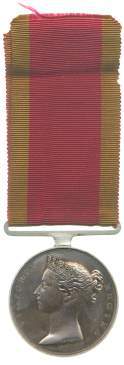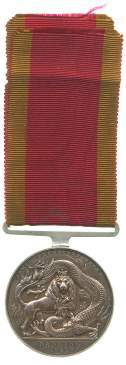Current Location: In storage
Maker(s)
Mint:
London
Ruler:
Victoria (1837-1901)
Artist:
Wyon, William
Ruler:
Victoria regina
(With the title of)
Entities
Categories
Description
In the early nineteenth century British commercial interests in China were mainly focussed on the sale of opium imported from India. The import monopoly was fiercely defended by British resident merchants, but in the 1830s the Chinese government, conscious that the drug traffic was creating a serious social problem and also badly damaging the balance of trade, began to clamp down on it and to try to prevent importation at all. By 1839 this situation had broken out into violence, both official and popular; warehouses were burnt, British residents evacuated from Guangzhou (Canton) and many British properties burnt or pillaged. The Cantonese evacuation led directly to the British conquest of Hong Kong by the evacuated forces, after which Chinese forces began to engage the British at sea and all trade was prohibited.
British retaliation was not long in following, but the fragmentation of Chinese administration meant that a great many treaties secured very little gain for either side, until the British forces moved on Guangzhou in 1841, securing a shortlived peace. After this broke down, a series of further British successes up the Pearl River from Guangzhou culminated in the capture of Nanking and a treaty of `everlasting friendship' between the two countries in 1842. War would be renewed in 1857.
This medal was the first designed for this campaign, but its design was rejected as being too offensive to the Chinese with whom peaceful relations had now supposedly been secured. A second design was issued to members of forces, both Army and Navy, involved in the 1840 capture of the island of Zhoushan (Chusan), or the subsequent campaigns of 1841 onwards up the Pearl River.
This is a rare proof in silver of William Wyon's initial, rejected, design. Lester Watson purchased it at some point before 1928.
Notes
History note: Gift of L. Hoyt Watson; ex Lester Watson Collection, bt before 1928
Legal notes
Given by Lester Watson through Cambridge in America, 2009
Measurements and weight
Diameter: 36.5 mm
Weight: 31.8 g
Acquisition and important dates
Method of acquisition: Given
(2009)
by
Watson, Lester
Dating
Production date:
AD 1842
Materials used in production
Silver
Techniques used in production
Struck
Inscription or legends present
Inscription present: Bust of Victoria facing left
- Text: VICTORIA REGINA
- Location: Obverse
- Type: Design
Inscription present: Lion with forepaws on dragon
- Text: ARMIS EXPOSCERE PACEM / NANKING / 1842
- Location: Reverse
- Type: Design
References and bibliographic entries
Related exhibitions
Identification numbers
Accession number: CM.1167-2009
Primary reference Number: 141261
Watson Catalogue: 53
Ordering: M-0050
Previous object number: LW.0050
Stable URI
Audit data
Created: Saturday 6 August 2011
Updated: Monday 25 March 2024
Last processed: Wednesday 14 May 2025
Associated departments & institutions
Owner or interested party:
The Fitzwilliam Museum
Associated department:
Coins and Medals





